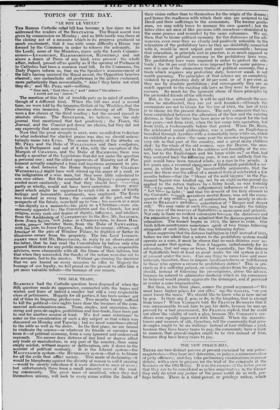"LE ROY LE VEULT." TOPICS OF THE D.Y.
THE Roman Catholic relief bill has become a law since we last addressed the readers of the SPECTATOR. The Royal assent was given by commission on Monday ; and so little bustle was there at the closing act of a measure which in its progress produced so much excitement, that it was with some difficulty a House was formed by the Commons in order to witness the solemnity. In the Lords, none of the Ministers, (save only the Lords Commis- sioners—LYNDHURST, ELLENBOROUGH, BATHURST,) and not above a dozen of Peers of any kind, were present: the whole
affair, indeed, passed Was quietly as if the opening of Parliament
to Catholics had been a common road bill. In the Commons, the Daily Papers inform us, that on the Speakers announcement of the bill's having received the Royal assent, the Opposition benches cheered ; one melancholic old gentleman in the gallery exclaimed, more pathetically than reverentially, " Alas ! they know not what they do;' and Mr. PEEL said—nothing.
" One said, ' God bless us ;' and ` Amen !' the other- 1 could not say amen.' "
The mention of this bit of twaddle puts us in mind of another,
though of a different kind. When the bill was read • a second time, we were told by the bragging Goliath of the Weeklies, that the cheering was immense. There was no cheering at all. There were a few cheers at the third reading ; but the second passed in absolute silence. The SPECTATOR, we believe, was the only journal that mentioned that fact positively ; the Times, the Journal, and the Courier put down no cheers, but they did not say expressly that none occurred.
Now that the great struggle is over, were we called on to declare
to what individual the chiefest praise was due, we should unhesi- tatingly name THE KING. The savage ferocity of the attacks on Mr. PEEL and the Duke of WELLINGTON and their coadjutors, both in Parliament and out of it (for, with the exception of the Marquis of CHANDOS, and the Duke of RICHMOND, there was hardly a member of the Legislature that did not make the question a personal one ; and the ablest opponents of Ministry out of Par- liament actually employed a long and ingenious argument to pro- voke a duel between the Home Secretary and Sir CHARLES WETHERELL,) might have well stirred up the anger of a weak or the indignation of a wise man, but they were little calculated to win over either. But the assailants of his Majesty's purpose pro- ceeded more cautiously ; and that they should harms partly or wholly, would not have been surprising. Every argu- ment which might be supposed to weigh with a man of kindly feelings and honourable sentiments, was employed. The KING was invoked in every form ; the example of the past, and the prospects of the future, were held up to him ; his reason as a man —his dignity as a monarch—his piety as a Christian—were cla- morously appealed to ; the Constitution and the Church, law and religion, every rank and degree of dignity, influence, and intellect, from the Archbishop...of CANTERBURY to the Rev. Mr. IsAAcsoN, from JOHN judge. in Chancery-lane, to Joie& HAL- COMB, preee-c barrister there, from the Duke of NEWCASTLE, with his tale, to JOHN GRANT, Esq., with his orange, ribbon,—all knocked at the gate of Windsor Palace, to frighten or flatter its illustrious owner from his propriety. The late Lord LONDON- DERRY once told Mr. BROUGHAM, in reply to an observation of the latter, that he had read the Constitution by halves only who praised Ministers for any public measure—that they, as responsible advisers, were chargeable with all the blame of their failures, but that when they succeeded, the thanks of the nation were due not to the servants, but to the master. Without questioning the doctrine that we are bound on every occasion to offer to Majesty the
homage of our loyalty, we feel proud on the present to offer him a yet more valuable tribute—the homage of our reason.


















 Previous page
Previous page